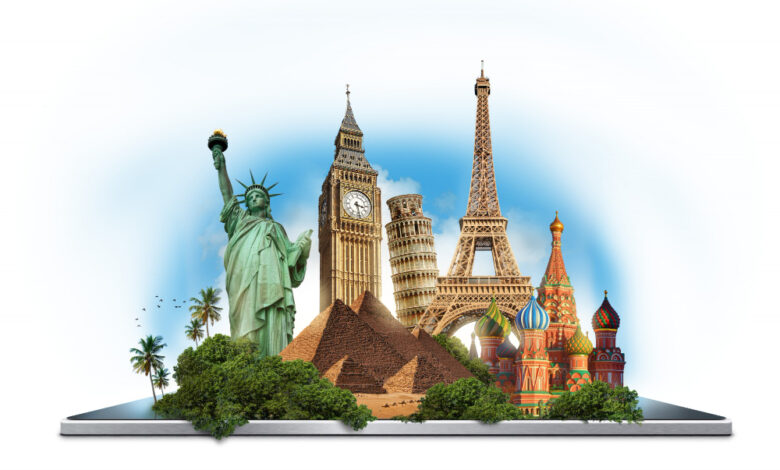
Tourism is more than just a vacation; it’s a powerful human endeavor that satisfies our innate desire to explore, to learn, and to connect with the world beyond our own.1 It is the act of traveling to new places for leisure, business, or pleasure, but its impact extends far beyond the individual journey.2 It is an industry that drives economies, bridges cultural divides, and offers a profound opportunity for personal growth.3 The simple act of packing a bag and stepping into the unknown is a ticket to a world of discovery, transformation, and unforgettable experiences.
The Transformative Power of Travel
The benefits of tourism are deeply personal and profoundly impactful. Traveling allows us to break free from the monotony of daily life and step outside our comfort zones.4 It provides a unique educational experience that no classroom can replicate, offering firsthand exposure to different cultures, languages, and histories.5 By visiting historical sites, wandering through bustling markets, and engaging with local communities, we gain a new perspective on the world and our place within it.6
Beyond intellectual and cultural enrichment, travel is a form of self-care.7 It reduces stress, boosts mental well-being, and inspires creativity.8 It gives us a chance to reflect, rejuvenate, and reconnect with ourselves.9 Whether it’s the thrill of an adventure travel trip or the peaceful solitude of a quiet retreat, the act of traveling serves as a catalyst for personal transformation.10
Exploring the Diverse World of Tourism
The world of tourism is not a monolithic concept. It is a mosaic of different travel styles, each catering to unique interests and passions.
- Cultural and Heritage Tourism: This form of tourism focuses on experiencing the unique cultures, traditions, and history of a place.11 Travelers visit ancient ruins, world-class museums, art galleries, and historic cities.12 Destinations like Rome with its ancient Colosseum or Kyoto with its serene temples are perfect for those who seek to immerse themselves in history.13
- Eco-Tourism and Sustainable Travel: This is a growing segment of tourism dedicated to responsible travel to natural areas that conserves the environment and improves the well-being of local people.14 Eco-tourists seek out unspoiled natural environments, often participating in activities like wildlife viewing, birdwatching, and hiking.15 The Amazon rainforest and the Galápagos Islands are prime examples of this kind of travel.
- Adventure and Thrill-Seeking Tourism: For those who crave adrenaline, adventure tourism offers an escape from the ordinary.16 This can include activities such as rock climbing in Patagonia, trekking in Nepal, white-water rafting, or diving with sharks.17 This form of travel challenges physical and mental limits and provides a sense of accomplishment.
- Leisure and Relaxation Tourism: The classic vacation, this is all about unwinding and de-stressing.18 It includes trips to sun-drenched beaches, luxurious spa resorts, and leisurely cruises. The goal is pure relaxation and a break from the demands of everyday life.
- Food Tourism: Also known as culinary tourism, this travel style is centered on exploring a destination through its cuisine.19 It involves visiting local markets, taking cooking classes, or embarking on food tours to sample regional delicacies and learn about the local food culture.20 Destinations like Paris and Bologna are famous for their food.21
Iconic Destinations: A Glimpse of the World
The world is full of breathtaking places that represent the pinnacle of various forms of tourism.
- Paris, France: A hub of cultural tourism, the “City of Light” is an eternal favorite.22 It’s home to iconic landmarks like the Eiffel Tower, the Louvre Museum, and Notre-Dame Cathedral.23 Beyond the landmarks, the city’s charm lies in its cafe culture, art scene, and romantic ambiance.
- Kyoto, Japan: A living museum of Japanese tradition, Kyoto offers a serene and deeply enriching experience.24 Its thousands of temples, zen gardens, and geisha districts provide a profound glimpse into a rich and preserved heritage.
- The Amazon Rainforest: Spanning multiple countries, this ecological marvel is the ultimate destination for eco-tourism.25 It is home to unparalleled biodiversity, offering unique opportunities to witness a world teeming with life and learn about conservation.
- New Zealand: For the adventurous soul, New Zealand is an entire country dedicated to adventure.26 Its dramatic landscapes, from the fjords of Milford Sound to the volcanic terrains of Tongariro, make it a perfect place for hiking, bungee jumping, and kayaking.
- Rome, Italy: With its ancient history and vibrant present, Rome is a traveler’s dream. The Colosseum, the Roman Forum, and the Pantheon stand as monumental testaments to a powerful past.27 The city’s lively streets, delicious food, and artistic treasures make it a timeless destination.
The Imperative of Sustainable and Responsible Tourism
As tourism continues to grow, so does the need for sustainability. Sustainable tourism is an approach that minimizes the negative impacts of travel on local cultures and environments while maximizing the benefits.28 It is a collective responsibility for both travelers and the tourism industry.
To practice responsible travel, you can:
- Support Local Economies: Choose locally-owned hotels, restaurants, and tour guides.29 Buy souvenirs from local artisans instead of large chains.30
- Respect Local Customs: Learn about and respect local traditions, dress codes, and social norms.31
- Minimize Your Environmental Footprint: Reduce plastic use, conserve water and energy, and choose eco-friendly transportation and accommodation options.32
- Be a Conscious Visitor: Do not disturb wildlife or natural habitats.33 Ask for permission before taking photos of people.
Practical Tips for a Better Journey
To make your next trip as rewarding as possible, keep these tips in mind:
- Plan, but Stay Flexible: Have a general itinerary, but leave room for spontaneous discoveries and unexpected detours.
- Pack Light: Travel light to make getting around easier and less stressful.34
- Learn a Few Phrases: Learning a few basic phrases in the local language can greatly enhance your experience and show respect for the culture.35
- Be Open-Minded: Embrace the unfamiliar.36 Try new foods, engage with people who are different from you, and let go of preconceived notions.
- Prioritize Safety: Research local customs, be aware of your surroundings, and purchase travel insurance for peace of mind.
Conclusion
Tourism is a powerful force for global understanding and personal enrichment.37 It is the bridge between cultures, a window into history, and an engine for economic growth.38 By traveling with a sense of wonder and responsibility, we not only enrich our own lives but also contribute to a better, more connected world.39 So, where will your next adventure take you?


